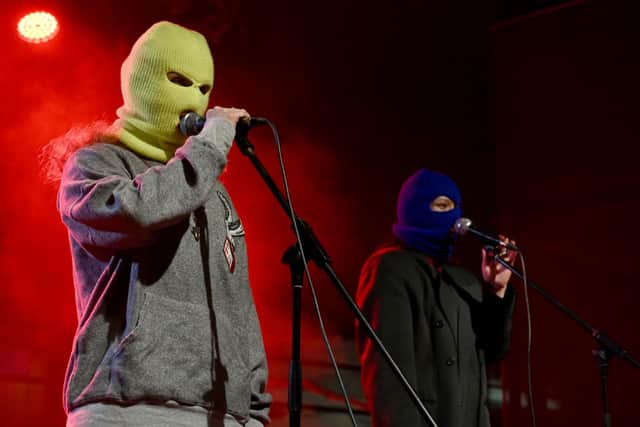Music review: Pussy Riot, Summerhall, Edinburgh
Pussy Riot, Summerhall, Edinburgh ****
Pussy Riot, sadly, are more relevant than ever, and it was the encore of this Edinburgh show which hit home hardest. Flashes of light and explosions were seen over the city of Mariupol on the screen behind the band, while edgy electro blared out and the voices of the four women on stage burst in urgent staccato. They are becoming “foreign agents”, they said, before playing the role of a child asking why war is called a “special operation”.
Internationally famous not so much for their art as for their guerrilla performance at the Cathedral of Christ the Saviour in Moscow in 2012, the all-female art-punk collective’s subsequent trial and conviction for “hooliganism motivated by religious hatred” made them ideological pin-ups around the world for those involved in activism, feminism, free speech movements and opposition to the Russian government.
Advertisement
Hide AdAdvertisement
Hide Ad

Freed in 2013, the group – and particularly their most visible long-time member, Maria Alyokhina – found themselves world-famous as activists, but unknown for their art beyond noisy guerrilla interventions in places where they were bound to cause trouble. The purest wider expression of their work came with Riot Days, seen at this venue during the Edinburgh Festival in 2019 – a memoir of Alyokhina’s experience in performance, music and film.
It took up the bulk of the show here, with the squalling, untidy electro backing offset by the fierce physicality of the sloganeering performances. The story ranged from the intensity of their controversial performance to the tension of the trial and the numb bleakness of imprisonment and hunger striking. “Freedom doesn't exist unless you fight for it every day,” they shouted, after a visual roll-call of many still in prison.
At the end, they took a moment to address their audience. “We didn't have a choice of where to be born, but we have a choice of how to live,” they said, almost as an apology. “Don't think that it's far away. It's not. We are living on one planet and I hope we have the same values. This is an anti-war tour.”